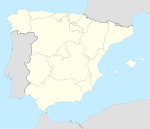Íllora
| Municipality of Íllora | ||
|---|---|---|
| coat of arms | Map of Spain | |

|
|
|
| Basic data | ||
| Autonomous Community : | Andalusia | |
| Province : | Granada | |
| Coordinates | 37 ° 17 ′ N , 3 ° 53 ′ W | |
| Height : | 759 msnm | |
| Area : | 197.43 km² | |
| Residents : | 10,054 (Jan. 1, 2019) | |
| Population density : | 50.92 inhabitants / km² | |
| Postal code : | 18260 (Íllora), 18350 (Alomartes), 18381 (Brácana), 18293 (Escóznar and Obéilar), 18380 ( Tocón ) | |
| Municipality number ( INE ): | 18102 | |
| administration | ||
| Website : | www.www.illora.net | |
| Location of the municipality | ||

|
||
Íllora is a municipality in the province of Granada in Spain with 10,054 inhabitants (as of January 1, 2019). The districts of Alomartes , Brácana , Escóznar , Obéilar and Tocón belong to the city .
location
The municipality is located 30 kilometers from Granada in a valley of the Sierra de Parapanda . The city borders the municipalities of Moclín , Pinos Puente , Moraleda de Zafayona, Villanueva Mesia and Montefrio, as well as the city of Alcalá la Real in the province of Jaen . It is around 5 km to the N 432 national road in the northeast and to the Granada - Antequera railway line in the south.
Museums
- The building of the Posito del Trigo Museum was built in 1738 in neoclassical style. It was originally a storage facility for grain. Later it became the town hall, in 1812 temporarily a barracks, then a library and now as the town museum it houses a collection of ceramics and tools from the old Arab castle.
- The Museo de Alomartes is located on the outskirts of the city and shows ethnographic things from the region, in particular the history of the mills in this area, as well as folk music and the traditional way of life of the residents.
Worth seeing
- In the center of the city, on the top of a cliff, lie the ruins of an old Arab castle. Some remains of the wall are still visible.
- The Church of Nuestra Señora de la Encarnación (Our Lady of the Incarnation) was built by Diego de Siloé in the sixteenth century.
Individual evidence
- ↑ Cifras oficiales de población resultantes de la revisión del Padrón municipal a 1 de enero . Population statistics from the Instituto Nacional de Estadística (population update).
Web links
Commons : Íllora - collection of images, videos and audio files

